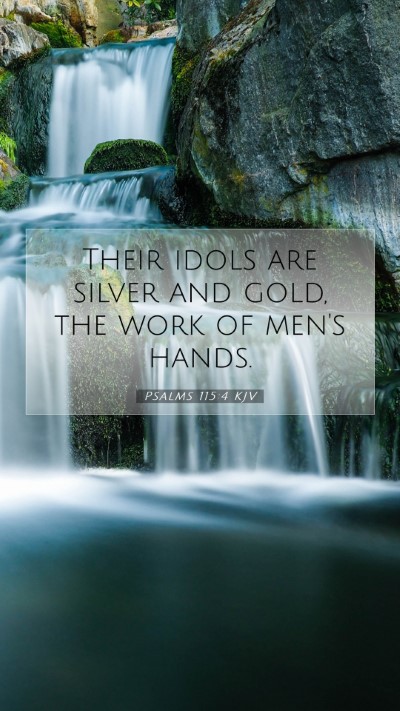Psalms 115:4 - Understanding the Verse
The verse Psalms 115:4 states: “Their idols are silver and gold, the work of men's hands.” This verse serves as a critique of idol worship, highlighting the emptiness and futility of relying on creations made by human hands for spiritual power or salvation. Let's delve into a combined interpretation of this verse using insights from notable public domain commentaries to provide a deeper understanding and Bible verse explanation.
Overall Summary
This verse is part of a larger section in Psalms that contrasts the living God with the lifeless idols of the nations. The psalmist emphasizes that idols, made from precious materials like silver and gold, are mere products of human craftsmanship and lack any divine attributes or powers. This calls into question their worth and the folly of worshipping something that man has made.
Commentary Insights
Matthew Henry’s Commentary
Henry emphasizes that the idols mentioned are not just physical objects but also symbolize the foolishness of humanity in trusting these lifeless images. He notes that these idols lack life, knowledge, and power, contrasting sharply with the living God who is active and involved in His creation. Henry further argues that the dependence on idols leads to a spiritual blindness and a distance from true worship.
Albert Barnes’ Notes
Barnes points to the nature of idols as "the work of men’s hands," suggesting that those who create them do so out of a misguided sense of security. He notes that while these idols may seem beautiful and desirable, they fundamentally fail to represent any true divine essence. Barnes elaborates on the implications of this dependence, indicating that those who rely on man-made objects are ultimately left empty and unsatisfied.
Adam Clarke’s Commentary
Clarke explains that the psalmist uses this verse to condemn the common practice of idolatry prevalent among surrounding nations. He elaborates on the materials used for these idols, silver and gold, symbolizing wealth and human endeavor; yet he contrasts this with the greatness and incomparability of God. Clarke reflects on the deceptive allure of idols and stresses the importance of worshipping the one true God who offers genuine solace and spiritual fulfillment.
Key Themes and Interpretation
- The Nature of Idols: The verse reveals how idols are intrinsically powerless. They are the product of human effort, contrasting sharply against the omnipotence of God.
- Human Dependency: The text highlights a spiritual condition where people rely on created things instead of the Creator, leading to spiritual bankruptcy.
- Critique of Idolatry: This verse is less a mere observation and more an indictment against the folly of worshiping idols that can do nothing, urging a return to true worship of God.
Application of the Verse
In applying Psalms 115:4 to modern life, one can reflect on the various "idols" that people might create today—whether they be material possessions, people, or even ideologies. Such reflections encourage believers to focus their trust and worship on God alone. The verse challenges individuals to assess what they may be holding onto in place of true faith and to consider the emptiness that can come from pursuing these "silver and gold" substitutes.
Related Bible Cross References
- Isaiah 44:9-20: A vivid depiction of the futility of idol making and worship.
- 1 Corinthians 10:14: An exhortation to flee from idolatry.
- Exodus 20:4-5: The commandment against making and worshipping idols.
Conclusion
Psalms 115:4 serves as a crucial reminder of the distinction between the living God and lifeless idols, inviting readers to consider the broader implications of what they value and prioritize in their spiritual lives. Through the insights drawn from various commentaries, one is encouraged to cultivate a deep and genuine relationship with God, free from the distractions and deceptions of materialism and idolatry. This exploration of Bible verse meanings opens the door for rich discussions in Bible study groups and offers substantial material for online Bible study and deeper theological exploration.


